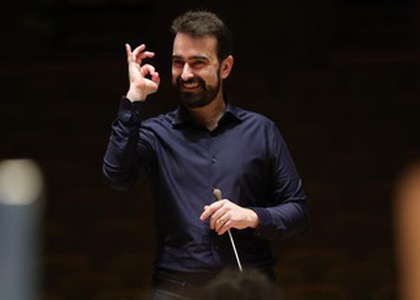> [Archived] Interviews

Interview with conductor David Molard Soriano
Mr. David Molard Soriano, you will conduct the Radio Chamber Orchestra in concert for the first time. What are the first impressions after the rehearsal?
I am impressed! I am very happy to meet the members of the orchestra, and I even had a nice and productive rehearsal with Mozart's "Jupiter" Symphony. They are used to playing Mozart, they phrase very easily, and the specific Mozartian style is natural to them. So the rehearsal was nice and we worked very well together I think we will achieve a lot this week.
In fact, the program you will present is entirely Mozartian. What place does the work of the classical composer occupy in your repertoire?
It occupies a very respectable and important place in my repertoire. I don't play Mozart very much, but I can say that his music is the basis, especially in the German repertoire, and in general, as well, because Mozart was a genius in terms of rhythm, melody, the inner construction of phrases, as well as in the construction of the accompaniment. Each of these aspects must be worked on when studying a Mozart score, and I think his creation is the basis for later music such as that of Beethoven, Haydn, Schumann, Brahms, Strauss and so on. And even in French music we find its influences. Mozart is a genius who laid the foundation for what came after him, in terms of music. So, in my repertoire, Mozartian creation occupies a significant place.
What message would you like to convey to the audience?
My message is to come to the concert because they will listen to a very interesting program, Symphony I, Concert no. 14 for piano and orchestra, and then his last symphony, no. 41, entitled "Jupiter". This program provides a beautiful overview of Mozart's entire life as we will begin with one of his childhood compositions - Symphony No. 1, then Concerto No. 14, written later, in his midlife, and conclude "Jupiter", one of the works composed near the end of his life. So I think it will be a nice way for the audience to experience the different compositional styles and writings used by Mozart. It's also a concert with a full Mozart program and it's going to be great: you have to come! With this orchestra it will surely be wonderful!
Photo credit: Barcan Photography
Translated by Cosmin-Ionuț Petriea,
University of Bucharest, Faculty of Foreign Languages and Literatures, MTTLC, year I
Corrected by Silvia Petrescu














